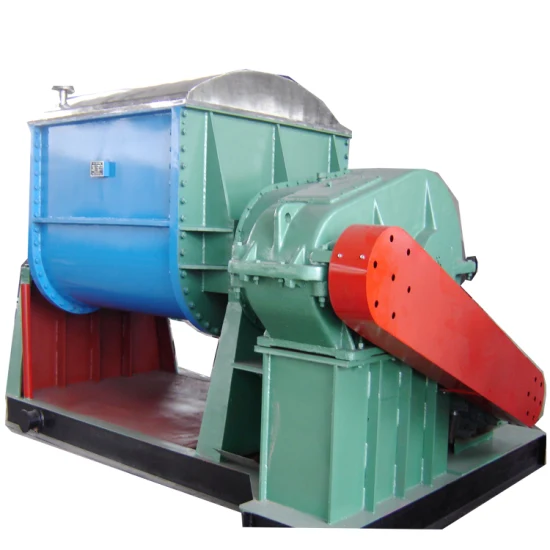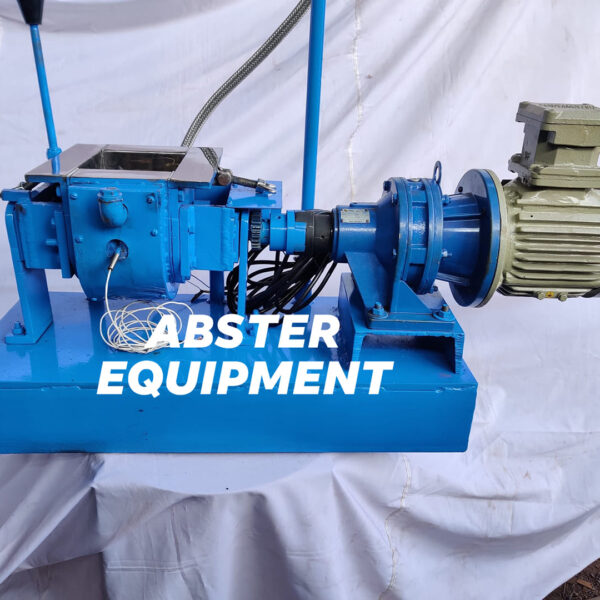Most Versatile High Viscosity Sigma Mixers
Sigma Mixers
Sigma blade mixers are the most commonly used mixers in the family of double arm mixers. Double arm kneader mixers consists of two mixing blades placed in a ‘w’ shaped horizontal trough. The rotation of the blades is either tangential to each other or the blades can overlap within the trough. The blades rotate toward each other at same speeds in case of overlapping blades or at differential speeds for tangential blades. The blades typically move near the container walls and each other at close clearances (~ 2 mm), resulting in homogeneous mixing. The small clearances generate very high shearing action resulting in particle size reduction.

ABSTER Mixers 1000 Litres Sigma Kneader Mixer Powered by 100 HP Motor

Laboratory Sigma Mixer
The blade profile of the sigma blade is such that the viscous mass of material is pulled, sheared, compressed, kneaded and folded by the action of the blades against the walls of the mixer trough. Tangential blade is used for material of higher viscosities such as adhesives, rubber compounds, flush colors, dyes and pigments. Overlapping blade action is used for materials of lighter viscosities such as carbon pastes, clay coating, creams, and ointments. The overlapping blade produces a lower kneading and shearing compared to the tangential blade action. Mixing homogeneity upto 99 percent and better can be achieved using the double arm kneader mixers. The power consumption in sigma blade mixer is higher compared to other types of mixers and can range from 45 to 75 kW/ m3 of mix material.
Overlapping Sigma Blades
Tangential Sigma Blade
Materials are charged through the top of the container for a fill volume of 40 to 65 percent of the total volumetric capacity of the mixer. The rotation of the two blades is through a heavy duty drive mechanism consisting of motor, gearbox, couplings and gears. Sigma mixers operate at low tip speeds of 60 – 70 metres per minute. Mixing is accomplished at ambient temperature or under conditions of controlled temperatures, depending on the process requirements. To maintain the desired temperature conditions inside the mixing vessel, the mixer troughs can be supplied with jackets for hot or cold media circulation.
The discharge of the material from the mixer container is either by tilting of the mixer container, bottom discharge valve, or by an extruder, screw situated in the lower portion between the two trough compartments.
Sigma Mixer with Tilting Discharge
Sigma Mixer with Bottom Discharge Valve
Different blade profiles have evolved, each of which is ideally suited to a specific application type. The sigma blade, masticator blade, spiral blade and naben blade are the widely used blade types. For fibrous materials, shredder blade designs are used.
Sigma Mixers
Kneader Mixer with Screw Discharge
Blade options for double arm kneaders
Sigma Mixers Applications
- Artificial leather
- Asafoetida
- Asphalt derivatives
- Bakelite
- Baking industry
- Batter
- Brake lining compounds
- Bulk molding compounds (BMC)
- Butyl rubber
- Carbon black
- Carbon brushes
- Ceramic paste
- Ceramic powders
- Chemicals
- Confectionery
- Chewing gum
- Crayons
- Dental mass
- Detergents
- Dough
- Dry powder to wet phase mixing
- Dyes
- Epoxy putty
- Erasers
- Explosives
- Fiberglass resin dough
- Flush colors
- Food dough
- Gaskets
- Grease
- Greasy inks
- Hot-melts
- Lead storage battery
- Magnetic tape coatings
- Marzipan
- Master-batches
- Mastics
- Magnetic tape coatings
- Metal powders
- Paints
- Pencil leads
- Pharmaceutical products
- Pigments
- Plastics
- Polishing pastes
- Polyester compounds
- Polymers
- Printing ink
- Putties
- PVC coatings
- Refractory materials
- Rubber compounds
- Sealing compounds
- Silicone rubber
- Sludge
- Slurries
- Solid propellant
- Stiff pastes
- Sugar pastes
- Waste reclamation
- Welding materials

